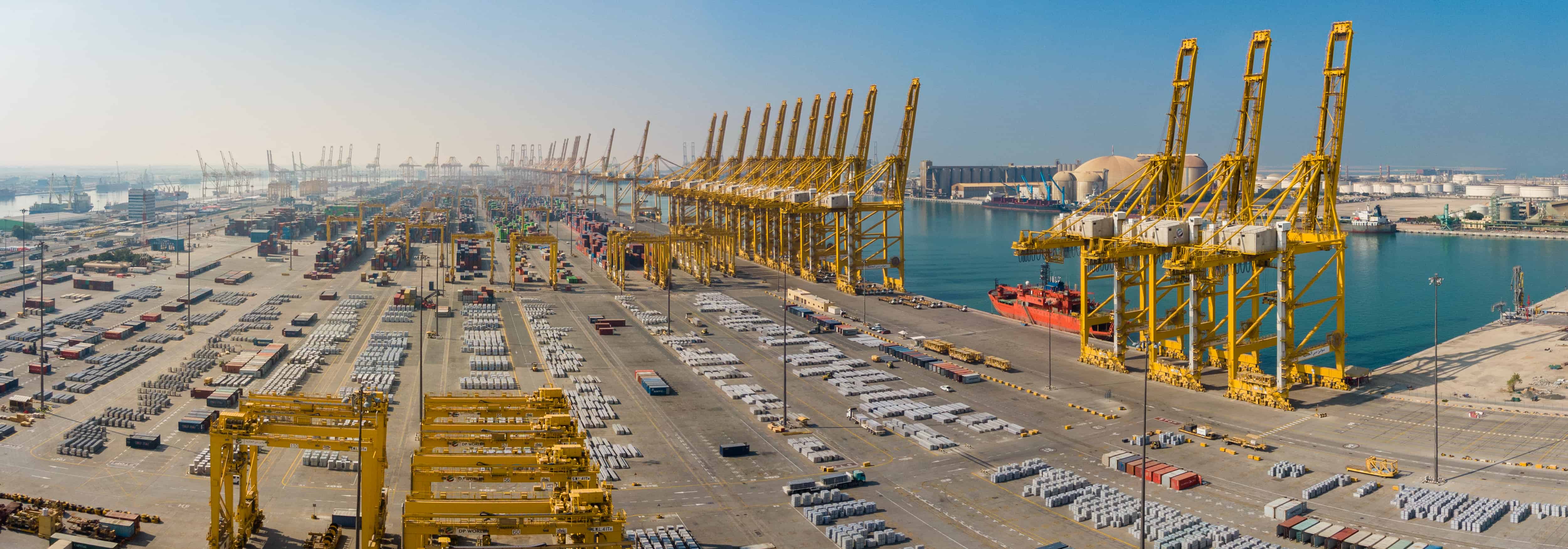The GCC has emerged as a critical node in the global trade of commodities. The reasons for the Gulf’s logistics infrastructure expansion are related to its strategic geographic location along the Asia-Europe trade route, which has resulted in significant expenditure on mega transport infrastructure in various GCC states.
Logistics market size in the GCC region
The UAE controls the largest logistics market in the GCC region at 42 percent. The sector is expected to continue its growth, particularly in the country’s air and sea freight markets. After the UAE, Saudi Arabia holds a quarter of the total GCC logistics market. Saudi Arabia’s logistics market is one of the fastest-growing globally, with heavy state investment aiming to transform it into the go-to logistics hub in the region.
Before the global coronavirus pandemic outbreak, the logistics market in the GCC region was projected to grow to over $100 billion. However, this estimate will have to be revised as the global pandemic, along with the inflation and high oil prices, has caused many industries in the region to decelerate in their growth.
Effect of inflation and high oil prices
Following the initial wave of COVID-19, inflation and high oil prices were driven mainly by causes such as pent-up demand and supply chain constraints, in addition to the recent Russian-Ukrainian war. This mostly raised prices in transportation, leisure, and consumer prices.

According to Amadou Diallo, DHL CEO Middle East & Africa, macroeconomic issues like inflation and high oil prices will always pose a challenge for businesses, especially logistics.
In an interview with TRENDS, he stated that, despite macroeconomic challenges, the GCC logistics sector is poised for solid growth.
“Because of the pandemic, regional lockdowns, and the war in Ukraine, there have been trading lane disruptions in air and maritime freight. In addition, the ongoing Covid-19 pandemic is still impacting the global supply chain, facing additional constraints outside of Europe”.
“We are addressing these challenges through early intelligence, using appropriate tools and technologies, and strengthening our services and offerings in the region. In addition, we are working on several innovations, service upgrades, and expansion plans, which we will share in due course”, he added.
DHL’s extensive global network and long-lasting partnership with most of the biggest air and ocean freight carriers enabled them to provide enough transport capacity to its customers.
He noted that the direct impact of fuel price changes on Deutsche Post DHL Group is minor. Fuel costs account for only 3% of the Group’s total cost base and are primarily related to their DHL Express aircraft fleet, and that fuel price movements are automatically factored into regular freight rate movements and are addressed in customer contracts is of significant relevance.
Diallo continued to assert that strategic supply chain management can help manage rising inflation to some extent. In addition, companies can improve operational efficiency by exploring automation and replacing tedious and time-consuming processes with more streamlined solutions.
Abu Dhabi’s logistics sector
DHL has further cemented its presence in the UAE. As a Freight Forwarder, DHL provides a full range of services such as air, sea, land, and warehousing solutions for the Abu Dhabi market. DHL Global Forwarding operates from two strategic locations, one site in KIZAD (seven warehouses) and the Abu Dhabi Airport Free Zone, where they have their main office and bonded warehouse directly connected to the airport.

According to Olivier Laurent, DHL Country Manager Abu Dhabi, DHL serves an extensive portfolio of customers operating in different sectors such as energy, defense, wholesale, pharma, industrial, and manufacturing. We help them to secure capacity with carriers and give them real-time visibility on their import and export movements.
Speaking about Abu Dhabi’s Abu Dhabi port and role in the logistics sector, Laurent told TRENDS that Abu Dhabi Ports is strengthening the emirate’s position as an integrated global trade, logistics, and industrial hub.
“Concession agreements have been granted to major carriers, like CMA CGM, COSCO, and MSC with three container terminals and one auto-terminal at the Khalifa Port in the UAE,” he said, adding that other agreements, such as a cruise terminal in Aqaba and an MoU to operate ports in Iraq and Egypt are also underway. These strategic projects will connect Khalifa Port to the Far East, Europe, the Americas, the Indian subcontinent, and the Middle East and position it as a regional trans-shipment hub for top carriers.
Meanwhile, KIZAD and ZONESCORP offer free zone and domestic industrial land facilities (pre-built warehouses and serviced land plots) for diversified clusters (polymers, metal, food processing, automotive, pharmaceuticals, and oil and gas). “This is facilitating the establishment of new industrial companies that will add more import and export throughputs via Abu Dhabi,” he added.
It’s worth mentioning that year on year, Abu Dhabi port volume throughput in TEU has been growing to reach 3.4M last year. Khalifa Port has been ranked in the top five of the global Container Port Performance Index (CPPI) developed by the World Bank and S&P Global Market Intelligence. Given this strong growth trajectory, DHL is working closely with Abu Dhabi Ports to connect KIZAD to their extensive global network to further propel the growth potential of Abu Dhabi as a gateway to the rest of the world.
Is Abu Dhabi Competing or Collaborating with Dubai and KSA in logistics?
Given that both Saudi and Emirati officials regard logistics hubs as diversification drivers, it is not surprising that competition in the maritime transport and logistics sector has heated up.
Dubai is one of the top five global maritime shipping and logistics hubs. One-third of the emirate’s GDP is generated by the Jebel Ali Port and Free Zone (JAFZA). Indeed, Jebel Ali is central to the UAE’s strategy to establish itself as a “nexus state.”
However, in line with its “Vision 2030,” Saudi Arabia is also attempting to establish itself as a leading regional and global logistics hub.
“Abu Dhabi, Dubai, and Saudi Arabia are all focusing on emerging as preferred international commerce and logistics centers,” Laurent said, adding that all three are strategically located, making them very competitive trade and logistics destinations.
“DHL is working to leverage the strategic geographical location and infrastructure capabilities of Dubai, Abu Dhabi and Saudi Arabia to deliver more efficient logistics solutions for the region,” he added.
“Many authorities, including customs, ports, free zone authorities, and the department of transport, are collaborating on the continuing Etihad Rail project to bring this new form of transportation to completion in the UAE and the wider region.”
Saudi Arabia and the UAE are both striving to reduce operational costs and facilitate faster deliveries, which will inexorably lead to the adoption of smart port technologies and the integration of the port value chain via digital platforms, as well as the creation of more opportunities for cooperation.

